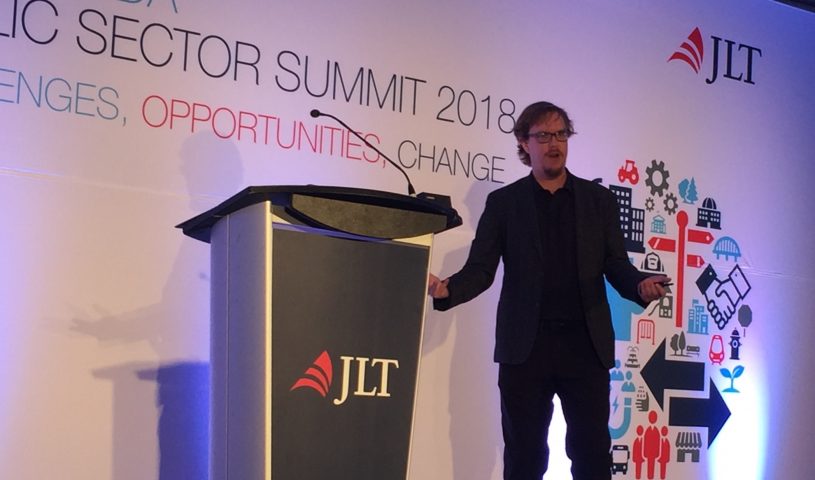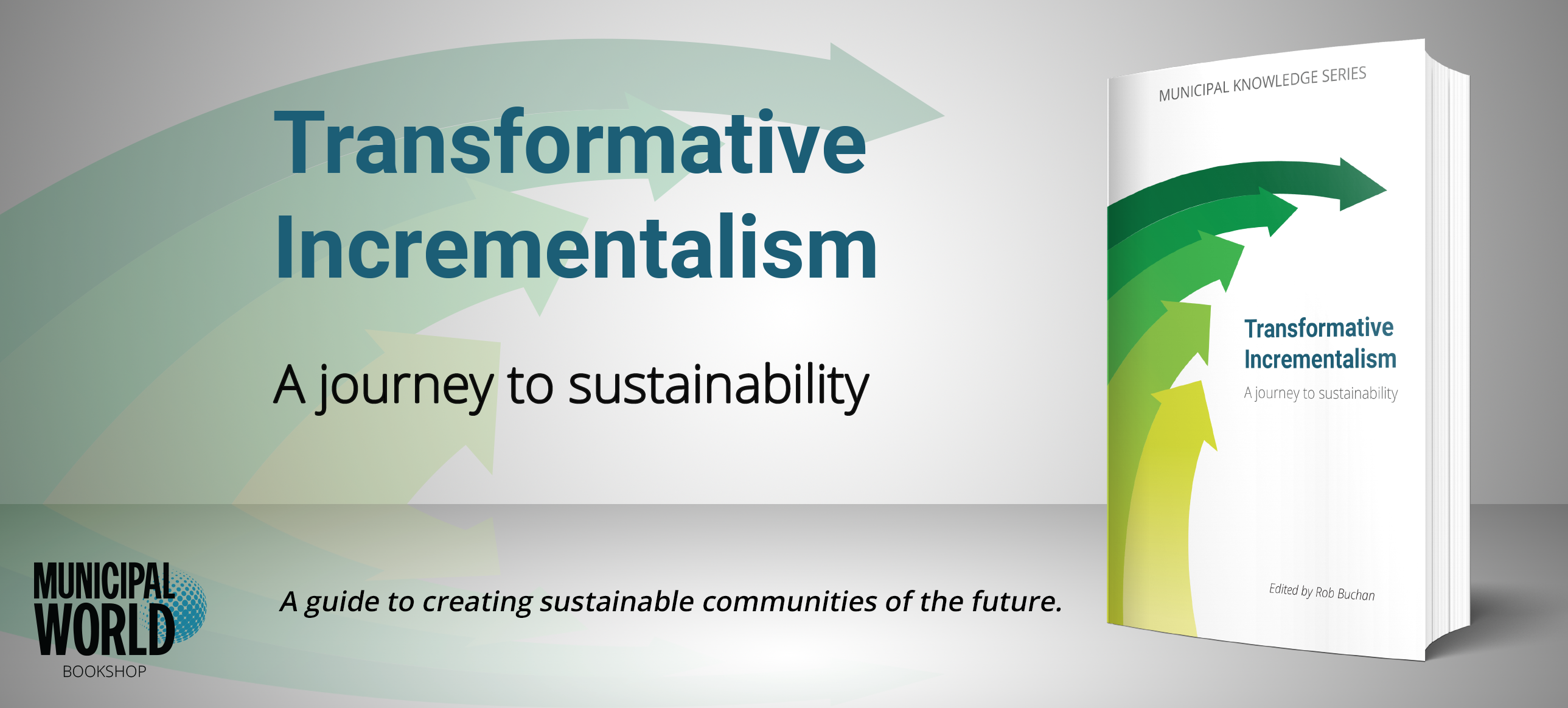Challenges, opportunities, and changes: The future is now

The future happens fast, and it’s happening right now – so, it’s best to be prepared. That was the big takeaway from the recent 2018 Public Sector Summit. Hosted by JLT Canada, the event brought together thought-leaders from across the country, with a program focused on the challenges, opportunities, and changes that are currently facing municipalities.
An impressive line-up of speakers shared their perspectives on what we’re experiencing right now in the areas of public private partnerships; automation; attracting talent; crisis management; smart cities; and leadership.
Public Private Partnerships
With foreign direct investment (FDI) becoming increasingly more important in economic development, attracting FDI is not just about landing jobs – it’s about landing globally connected firms that can benefit an entire region. Toby Lennox, President and CEO of Toronto Global discussed how municipalities can increase opportunities for attracting FDI by working together from a regional perspective.
Lennox drew from the example of the City of Toronto’s recent Amazon HQ2 bid. Because businesses make location decisions based on the assets of entire regions and not individual cities, he said, they realized that no one city alone would be able to provide Amazon what it needed. The best way to approach the bid would therefore be to present a wider regional proposition that included Waterloo, Guelph and others. He noted that Toronto Region now has a regional population of 6.4 million, and that 75%- 90% of the value of investments stays within the Region.
The public release of the bid book was important not only for transparency, but for increased exposure around what the region has to offer. Following its release:
- the bid document was downloaded 17,300 + times;
- Toronto Global added 259 companies to their pipeline with 36 companies investing in the Toronto Region from 2017- present; and
- there was 400% + increase in the number of visits to Toronto Global website.
FDI, regardless of location, said Lennox, benefits the region as a whole; and while the host jurisdiction sees the greatest share of economic benefits associated with investment, all regional jurisdictions ultimately benefit in terms of employment creation, tax revenue, and the purchase of supplies and services.
He concluded that being short listed was really important to raising the economic profile of not only the City of Toronto, but Canada as a whole.
Automation
We have a powerful set of technology tools at our fingertips today, but where is it leading us? It’s leading to smart communities and smart homes, says futurist Jesse Hirsh – and hopefully to smart people, “because a smart community without smart people is a dystopia.”
Hirsh challenged delegates to think critically about the impact of technology on their communities, emphasizing the value of the plethora of data being generated and how today’s companies are currently clambering for it, getting it in a variety of ways. “Most people think Uber is a transportation company” he says “but it’s really a data company that started out in the transportation sector … that now knows more about Toronto than the city does.”
The data is so valuable because it is the foundation for artificial intelligence (AI). And, there is a myth, he said, that data algorithms and AI-powered decisions are free of the biases that plague human decisions. On the contrary, those decision absolutely reflect the biases of the people that created them. He discussed the emergence of “algorithmic authority” – and how algorithms are now making decisions on our behalf all the time, using our data, but without our input.
There are opportunities for that data to be used for the benefit of communities – to anticipate and prevent problems, and to quantify how our communities work. But, there are also major implications for that data to be commercialized, he said. His prediction: FaceBook will eventually be in the insurance business, and your social media streams could be used to predict your credit score. (“After all, you’re only as smart as your friends are.”)
We need to start asking questions about our data and the ownership of it … and how it’s being used. In the future, he said, we’ll be asking, “What’s the morality programming of this car?” In smart communities today, we should be educating our citizens about new technologies, how they’re powered, how to use them, and how to think critically about what we’re seeing on our screens.
Attracting Talent
The competition for attracting top talent is increasing but what can municipalities do to create a culture that not only appeals to, but also retains talent? That was the challenge addressed by future of work expert Cheryl Cran, as she shared insights into the current reality of finding and keeping good people. She identified the following 10 keys to attracting change makers:
- innovation culture;
- opportunities for growth, learning, and progression;
- fun, family-focused communities;
- technology;
- leaders who mentor, guide and inspire;
- freedom to “fail”;
- remote work/ projects;
- inclusive leadership;
- diverse experiences; and
- empowered culture.
She emphasized that, to be successful in attracting talent, leaders need to take multiple perspectives, and use creative intelligence when thinking about their workplaces. Are these the right jobs? Do we need a full time person? We need to ask these kinds of questions, and we need to have a people-first mentality, she said.
Crisis Management
If a crisis were to strike tomorrow, would we be ready? It’s a question that too many organizations fail to ask and address before it’s too late. Crisis management expert Melissa Agnes presented a roadmap for preparing for the unexpected, and shared four “secrets” to making a giant leap forward in becoming crisis-ready:
1. Choose the right lens – Is this event an opportunity or is it a nuisance?
2. Take a 360 degree view of your key stakeholder – What will they expect from us?
3. Understand the difference between an issue and a crisis.
4. Establish trust now – before your organization is in crisis.
Agnes stressed that, outside of crisis, there are lots of opportunities every day for organizations to create real connections in the community and to take proactive steps that will foster increased trust and credibility. This helps ensure that, when crisis does strike, the organization won’t be operating from a deficit.
Smart Cities
John Longbottom, IBM’s lead on Canada’s Smarter Cities initiative provided his thoughts on the current status of “smart cities” and the progress that has been made in the 10 years since the term was first coined. Certainly, he said, cities did not move as quickly as originally anticipated in adopting smart technologies. Citizens wanted increased transparency, and government stakeholders were asking important questions, demanding solutions that were trusted, inclusive, and adaptive.
Today, the barriers of cost and complexity have now been lowered. And important challenges have been addressed by new platforms such as blockchain, APIs, and microservices.
Longbottom concluded that by using these new tools and technologies, and leveraging public/private partnerships and data to benefit the community, cities are now in a position to pace up their intelligence advantage.

A graphic recorder captured and shared key ideas from the presentations throughout the event.
Leadership
To say that we live in “interesting” times is an understatement, noted Ken Coates, Canada’s Research Chair in Regional Innovation. As MC for the event, Coates shared his reflections on the various presentations throughout, and also delivered the final keynote on “leading into the unknown.”
He noted how this is a time that calls for leadership that can inspire people to believe that things can be better. This doesn’t mean we must have leaders with a special brand of charisma; Coates said that leadership is not about show … it’s about competence. “Leadership skills can be used as much for evil as they can be for good. It’s really just a set of tools, and you decide how to use them.” The real value is in bringing a realistic vision, focusing on the things that matter, and showing that you can perform as well in times crisis as you can in times of opportunity. In this context, Coates shared some advice for leaders:
- People want to know who you are in your heart and soul, so show them.
- Be the person who inspire discussion and debate.
- Talk to stakeholders about what they want, and find out what they are willing to do.
- Understand that there will be critics, and get good at staring them down.
- Hire people smarter than you.
- Never underestimate the lifelong impact of hard comments and soft comments.
- Find one person to praise every day.
- Even though courage is hard, it’s necessary to stand up to bullies … it’s the leadership trait in shortest supply today.
- Don’t be afraid to lose employees to other jobs.
- Understand that anger and negativity don’t work.
Even if you do all of the above, don’t count on getting accolades in the leadership moment. “The ultimate test of leadership,” says Coates, “is what people say about you when you leave the room … and what they say five and ten years from now.” MW



